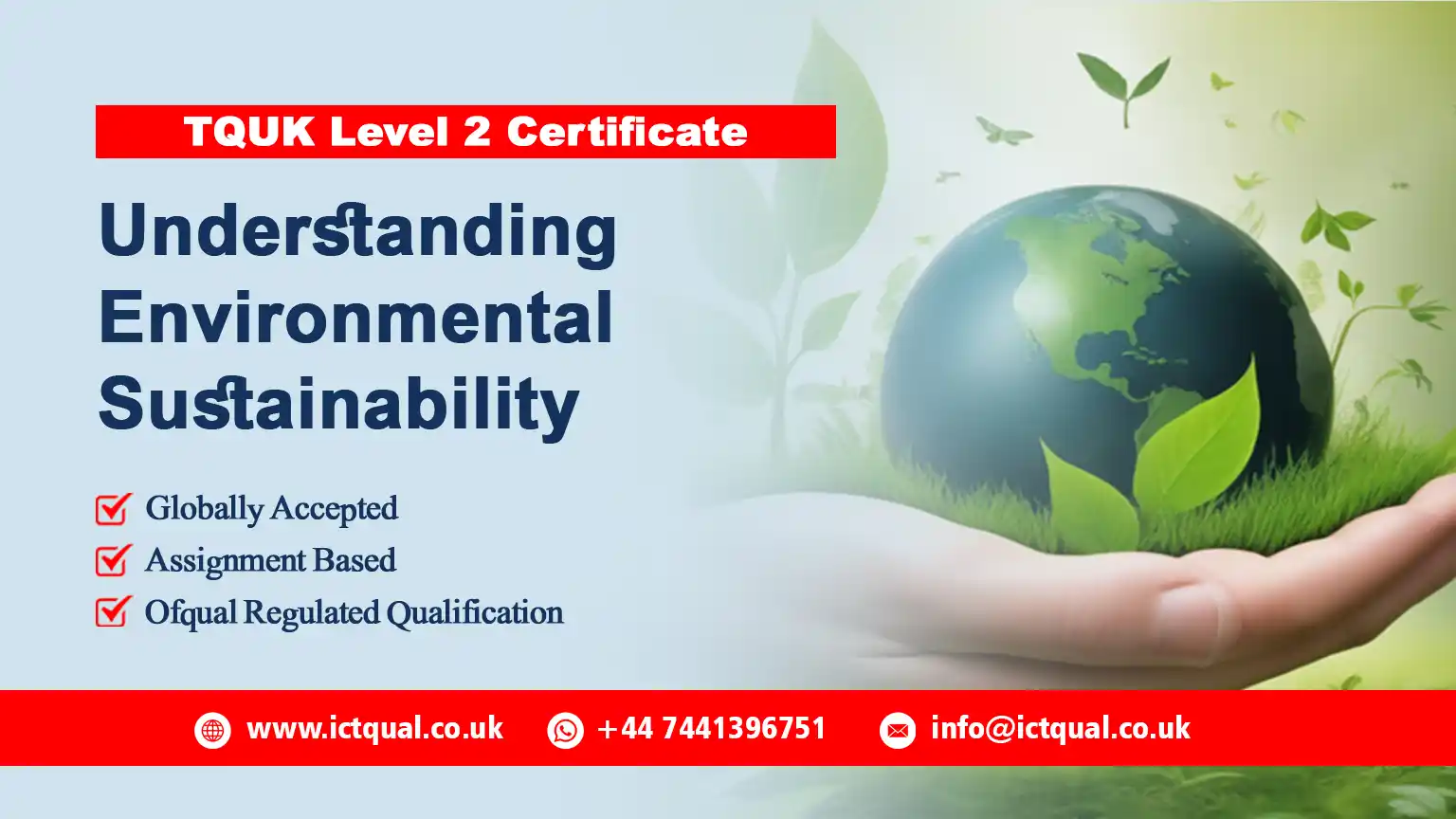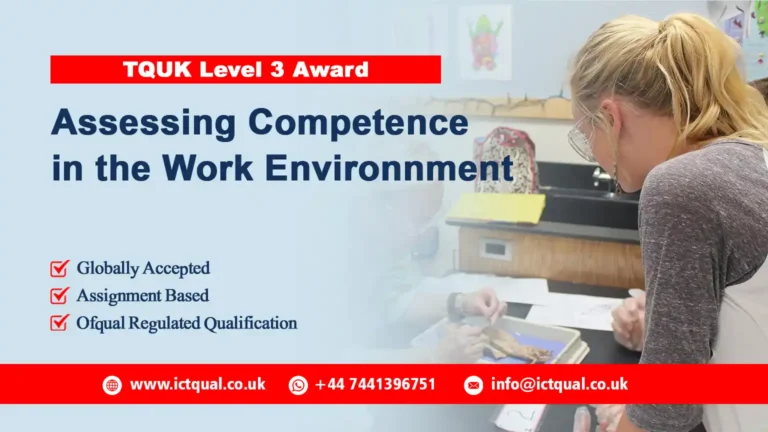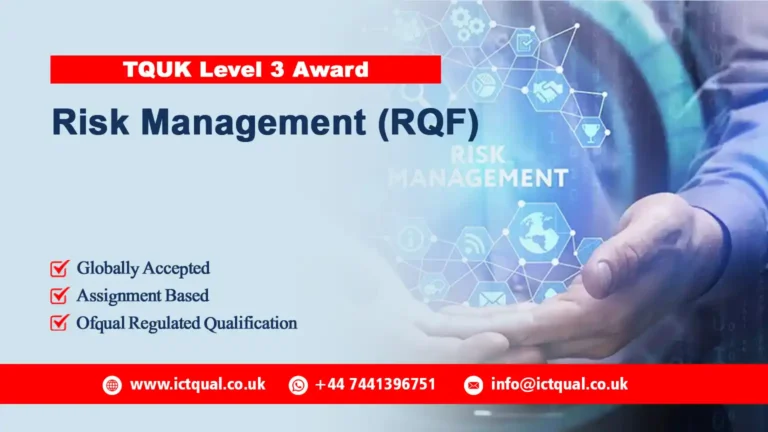Embark on a transformative journey toward environmental sustainability with the TQUK Level 2 Certificate. Developed by Training Qualifications UK (TQUK), this certificate offers a comprehensive exploration of sustainability principles, empowering you to navigate the complexities of our changing world.
TQUK’s Level 2 Certificate sets itself apart with its dynamic curriculum, delving into the core of environmental sustainability—from its foundational concepts to practical applications and global implications. Led by industry experts committed to driving positive change, the course invites you to engage in immersive learning experiences, blending theoretical knowledge with real-world scenarios to deepen your understanding.
Experience the flexibility of learning with TQUK, offering both traditional classroom settings and online platforms to suit your lifestyle and preferences. Through hands-on activities and interactive sessions, you’ll acquire essential skills in sustainable practices, legislative frameworks, and impact assessment, preparing you to become a catalyst for sustainability in your community and workplace.
Upon completion, you’ll emerge equipped with a comprehensive grasp of environmental sustainability, ready to tackle pressing issues and advocate for meaningful change. In a world where sustainability is not just a goal but a necessity, your expertise in driving sustainable initiatives will be invaluable.
Join us in shaping a brighter, more sustainable future. Enroll in the TQUK Level 2 Certificate in Understanding Environmental Sustainability today and embark on a journey of discovery and impact. Together, let’s pave the way toward a greener, more sustainable world with TQUK.
The TQUK Level 2 Certificate in Understanding Environmental Sustainability (RQF) stands as a comprehensive qualification offered by Training Qualifications UK (TQUK). It serves as a gateway for learners to acquire essential knowledge and insight into the principles and practices of environmental sustainability. Throughout the course, participants explore the core concepts of environmental sustainability, including its global significance and the critical challenges facing our planet, such as climate change, pollution, and resource depletion. They delve into sustainable practices and solutions, ranging from renewable energy to waste management, aimed at mitigating environmental impacts and fostering conservation efforts.
Furthermore, the certificate delves into the intricate landscape of environmental legislation, regulations, and policies at local, national, and international levels. Learners gain an understanding of the legal frameworks essential for compliance and effective environmental management. The course emphasizes the pivotal role of both individual and collective action in nurturing environmental sustainability. It underscores strategies for personal behavior change, community engagement, and advocacy to promote sustainable practices and foster a culture of environmental responsibility.
Moreover, learners are exposed to the significance of environmental awareness and education in instilling sustainable attitudes and practices among individuals, organizations, and communities. Additionally, the course equips participants with the skills to conduct environmental impact assessments and evaluations, enabling them to comprehend the consequences of human activities, projects, and policies on the environment.
The TQUK Level 2 Certificate in Understanding Environmental Sustainability provides a valuable credential for individuals seeking to deepen their understanding of environmental issues and sustainability practices across diverse sectors and industries. Successful completion of the certificate opens doors to a range of career opportunities in environmental management, sustainability consulting, corporate social responsibility, conservation, and related fields. Ultimately, it contributes to nurturing a more environmentally aware and responsible workforce, driving positive change for the future of our planet.
The TQUK Level 2 Certificate in Understanding Environmental Sustainability (RQF) consists of 6 mandatory unit, 15 credit value, and 101 Guided Learning Hours (GLH) for this qualification.
Mandatory Units
| Sr# | Unit Title | Credit Hours |
|---|---|---|
| 1 | Principles of sustainable communities | 3 |
| 2 | Principles of sustainable development | 3 |
| 3 | Principles of sustainable energy management | 3 |
| 4 | Principles of sustainable transport | 2 |
| 5 | Principles of sustainable waste management | 2 |
| 6 | Social responsibility of businesses in relation to sustainability | 2 |
The TQUK Level 2 Certificate in Understanding Environmental Sustainability (RQF) is designed for individuals across various sectors and professions who are passionate about environmental conservation and sustainability. This course is particularly suitable for:
- Environmental Enthusiasts: Individuals who have a keen interest in environmental issues and are motivated to deepen their understanding of sustainability principles and practices.
- Students: Those pursuing education in environmental science, sustainability studies, geography, urban planning, or related fields can benefit from this course to enhance their knowledge and credentials.
- Professionals: Professionals working in environmental management, sustainability consulting, corporate social responsibility (CSR), energy management, waste management, urban planning, and related fields can expand their expertise and advance their careers with this qualification.
- Policy Makers and Government Officials: Individuals involved in policymaking, regulation, and governance related to environmental sustainability and conservation can gain valuable insights and tools from this course to inform their decision-making processes.
- Business Leaders and Entrepreneurs: Business owners, managers, and entrepreneurs seeking to integrate sustainability principles into their operations, supply chains, and corporate strategies can benefit from understanding environmental sustainability concepts and best practices.
- Community Leaders and Activists: Community leaders, activists, and advocates working towards sustainable development and environmental justice can leverage the knowledge and skills gained from this course to drive positive change within their communities.
- Educators and Trainers: Educators, trainers, and facilitators involved in delivering environmental education and awareness programs can enhance their teaching materials and methodologies with insights gained from this qualification.
TQUK Level 2 Certificate in Understanding Environmental Sustainability is suitable for anyone who is committed to promoting environmental stewardship, addressing global environmental challenges, and contributing to the transition towards a more sustainable and resilient future.
Learning Outcomes for the Study Units:
- Principles of Sustainable Communities:
- Grasp the essence of sustainable communities and their pivotal role in fostering holistic well-being encompassing environmental, social, and economic dimensions.
- Discern the essential components and distinguishing features characterizing sustainable communities, including efficient resource utilization, equitable access to amenities, and robust community engagement.
- Assess exemplary case studies and effective paradigms to discern successful models of sustainable community development, drawing insights for potential application in varied contexts.
- Apply sustainable community planning and design principles creatively to navigate prevailing and forthcoming challenges in community development initiatives.
- Principles of Sustainable Development:
- Comprehend the foundational principles and overarching objectives underpinning sustainable development endeavors, acknowledging their pertinence in addressing multifaceted global environmental and societal dilemmas.
- Explore the intricate interplay among economic prosperity, social equity, and environmental stewardship inherent within sustainable development frameworks.
- Evaluate the efficacy of international accords, policy frameworks, and collaborative initiatives in advancing the overarching goals of sustainable development.
- Devise actionable strategies for effectuating the integration and implementation of sustainable development imperatives across diverse scales, from local to global spheres.
- Principles of Sustainable Energy Management:
- Acquire an in-depth understanding of the diverse array of sustainable energy resources, spanning renewable and alternative energy modalities, and their potential contributions to energy transition endeavors.
- Articulate the fundamental tenets of energy efficiency, conservation practices, and judicious energy resource management strategies aimed at curbing carbon emissions and ameliorating climate change impacts.
- Employ analytical frameworks to scrutinize prevailing energy consumption patterns and identify opportune avenues for the deployment of sustainable energy solutions across residential, commercial, and industrial sectors.
- Assess the policy landscapes, regulatory frameworks, and incentivization mechanisms facilitating the adoption and mainstreaming of sustainable energy technologies and practices.
- Principles of Sustainable Transport:
- Recognize the imperative of cultivating sustainable transportation ecosystems conducive to the curtailment of greenhouse gas emissions, alleviation of traffic congestion, and mitigation of air quality degradation.
- Engage with the foundational principles underpinning urban planning strategies, infrastructure design paradigms, and modal shift imperatives geared towards fostering sustainable transportation modalities, including pedestrian-friendly environments, cycling infrastructure enhancements, and robust public transit systems.
- Conduct holistic impact assessments to ascertain the broader societal, economic, and environmental ramifications of transportation policies and initiatives, thereby informing evidence-based decision-making processes.
- Formulate strategic interventions aimed at the promotion of sustainable transportation alternatives and the enhancement of accessibility while minimizing adverse externalities.
- Principles of Sustainable Waste Management:
- Internalize the guiding principles underpinning the waste hierarchy, emphasizing waste reduction, reuse, recycling, and responsible disposal practices in the context of sustainable waste management paradigms.
- Scrutinize the ecological, societal, and economic repercussions associated with divergent waste management strategies, encompassing landfilling, incineration, and composting modalities.
- Engage with innovative technologies and emergent trends in waste management aimed at fostering waste minimization, resource recovery, and the propagation of circular economy principles.
- Formulate and promulgate policy prescriptions and public outreach initiatives aimed at fostering a culture of responsible waste management behavior and attaining ambitious waste reduction targets.
- Social Responsibility of Businesses in Relation to Sustainability:
- Delve into the multifaceted dimensions of corporate social responsibility (CSR), appreciating its instrumental role in fostering sustainable business practices and nurturing stakeholder trust and confidence.
- Contemplate the ethical, societal, and environmental dimensions implicated in business operations and decision-making processes, thereby cultivating a nuanced understanding of corporate social responsibility imperatives.
- Strategize the integration of sustainability principles into the fabric of business operations, supply chain dynamics, and stakeholder engagement mechanisms, thereby fostering a corporate ethos grounded in environmental stewardship and social equity.
- Peruse diverse case studies and exemplary instances of socially responsible business conduct, discerning their salient contributions to environmental conservation, societal welfare, and economic prosperity.







